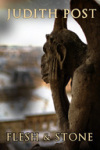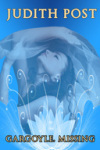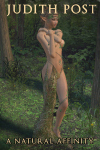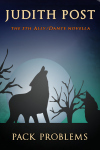Judith Post's Blog, page 123
February 26, 2014
Quick news
My novella bundle is on Indie Author Anonymous. Great site, if you have a chance to take a look. http://indieauthoranonymous.com/2014/02/26/spotlight-book-gorgons-gargoyles-by-judith-post/


February 23, 2014
Writing: why plotting is good for me
I’ve touched on this before. I’m a plotter. Not everyone is, and that’s fine. One of my writer friends tells me that if she knows what’s going to happen in a scene, she doesn’t write it. The surprise element is gone, and it’s too boring to bother with. But the opposite holds true for me. If I write by the seat of my pants (like my pantser friends), I’m always struggling to come up with new scenes and new ideas and trying to sequence them together. I feel like I’m blindfolded and “feeling” my way from one scene to the next in my story.
When I started work on my third Fallen Angels novel, I sat down to scribble out the main idea for the story. After that, an opening scene came to me. Since this is a sequel, I knew the main characters, but I made character wheels for the new characters who’d be in this book. I played with and discarded several turning points for the main plot before I settled on two major ones, and I knew the ending. Sometimes, that’s all I’ve got when I start a book–the inciting incident, set up, two turning points, and the ending. But when I put my fingers on the computer keys to write these basics for Enoch and Voronika, plot points just kept coming to me.
My writing muse smiled on me. Thank you, Muse! When I got done, I had twenty-seven plot points for the novel. I’d write one, and the next one would pop into my mind. The what if’s led from one scene to the next. Awesome, because in my ideal world, I like to have one plot point for each ten pages of manuscript. Just an average. Some scenes or chapters are short and some are long, and sometimes I sneak two scenes into one chapter. And usually, when I write, new scenes spring from things my characters do that I could never think of in advance.
This is NOT my typical brainstorming session, but I’ve learned that no two books are ever alike. I fight with some books, trying to bring them to life, and others are like a gift that makes plotting them easy. This one was a gift.
I was so happy, I told one of my writer friends about it, and she shrugged. “That would ruin the book for me,” she said. But one thing I’ve learned about my own writing style is that if I have a sense of direction, my characters actually surprise me more. I look at my notes and know what needs to happen in a scene, and I think I know how I’m going to accomplish that, but then my characters whisper, “But what if I did this instead?” And if it doesn’t change the direction of the story, and it’s better than what I came up with, I let my characters have their way. And almost always, their way has more conflict and more interest.
For me, if I don’t have to think about the basics of writing, then I can concentrate on adding more drama and depth. Having plot points frees my imagination to explore how to get the maximum punch from each scene. And you’d think, with twenty-seven plot points, I wouldn’t hit snags or worry about soggy middles. But I’ve never found that to be true. Somehow, somewhere, all the plot points and subplots tie themselves into knots, and what looked so neat and tidy on paper clusters into a giant mess that my mind tries to hide from. My pacing bogs down into a morass of confusion, but I know that if I follow my guideposts, I’ll eventually slog in the right direction and hit solid ground.
Each writer has to find what works for him or her. But I’m a champion for plot points. I’d rather travel with a map than follow the sun and stars and hope I’m going in the right direction.
(Just want to let you know that I won’t write a blog next Sunday. My friends are coming to my house for an Oscar Party. I’ll be cleaning and cooking and having fun. But I’ll be back the Sunday after that. And if anyone has any topic they’d like me to write about, leave me a comment, and I’ll give it a shot.)
http://www.judithpostswritingmusings.com/
https://www.facebook.com/JudithPostsurbanfantasy


February 16, 2014
Writing & The Meaning of Life
I’m not sure what pulls people to become writers. There are easier things to do in life, but many of us feel driven to put ideas on paper and to tell a story from our own perspective. We can tinker with what we include or emphasize, and we can tilt our fictional world to explore what interests us.
For me, one of the joys of writing is exploring some of the great WHYs that plague me. What gives life meaning? Each of my characters might give a different answer to that question, and that lets me look at it from many perspectives. Are people born with certain, predetermined character traits? And which strengths do I admire and which weaknesses repel me? Sometimes, when I’m writing, the answers surprise me. I might respect a passionate villain who believes in his cause while I cringe at a protagonist who whines and feels sorry for himself. But then, what made my characters the way they are? A sad childhood? Unloving parents? How much of who we are is determined by genes, and how much by environment? Is there Destiny? Why do some characters buckle under the slightest adversity and others rise above all odds? I might not have definitive answers for those questions, but I can give my characters reasons and motivations for each story I write.
When we write, our beliefs, values, likes, and dislikes seep into our stories. For one of my friends, telling lies is at the top of her list of sins. When she paints a villain in her stories, he’s often a liar–because if he lies, he probably does much, much worse. Betrayal is often considered one of the worst character flaws, but when I read Prince of Thorns, by Mark Lawrence, his protagonist believes that if he cares too much about anyone, it weakens him. And Jorg would consider himself weak if he sacrificed a victory to save a friend. He’s very capable of betraying people close to him. Since Jorg lives in such a violent world, though, the reader can empathize with Jorg’s view, so betrayal is still repugnant, but sometimes, it seems necessary. As writers, we can play with what’s good and what’s evil.
I’ve heard a few speakers claim that every writer explores certain, broad themes in their works. They repeat those themes over and over again in different settings and under different circumstances. Do we each have a question that we’re trying to answer with our stories? Do romance writers believe that love can conquer all? Or that nothing in this world matters more than love? Mystery writers reinforce the idea that justice will prevail and good will conquer evil. Horror writers scare us because evil has a decent chance of winning and good sometimes gets trampled. Are those the authors’ world views that are reflected in their writing? For a friend of mine–who believes Shakespeare’s view that all the world’s a stage holds true–none of it really matters, because we each only act out whatever part we’re given before we step into Earth’s spotlight. His stories have a temporary, what happens now only seems important quality to them.
Maybe we write to understand ourselves and our lives more. We can turn ideas over and come at them from angles we’d never try in real life. We can create characters we don’t like and let them push and prod protagonists we do care about. We can study what makes each character tick, what defines him and sets him apart. Writing is a great experiment in which we can decide what’s important and what isn’t in the worlds we create. And just maybe, testing out those what-ifs also helps us define who we are and how we see our own world.


February 9, 2014
Writing–Size DOES Matter
When I first started writing, I sat down, pounded on my keyboard, and wrote until a story was done. I didn’t consider word count or length. It didn’t occur to me that 3500 words might sell better than 15,000 words in some markets. I quickly learned to pay closer attention. If I was interested in getting a story in a certain magazine, I looked up the submission guidelines before I ever wrote the first word.
When I worked on short stories for Alfred Hitchcock’s mystery magazine, the guidelines stipulated stories not over 12,000 words. I looked at Ellery Queen mystery magazine, and the guidelines were 2500-8,000 words. At a mystery writers’ conference, someone said that the slots for longer stories usually went to writers with “names.” That made sense to me. Editors use the names of well-known writers to help sell magazines, so I tried to keep my stories in the shorter part of the word range, usually aiming for 3,000 to 3500 words, and I think that gave me an edge.
When I started concentrating on writing novels, I looked up guidelines for those, too. At the time, mysteries often ranged from 70,000 to 90,000 words for mid-list writers. Most still do. Big writers don’t have to worry as much about going too long or too short. They don’t have to follow as many rules as beginning writers do. The first book they published is worth a look, because they weren’t famous when they sold that one, but usually, it’s safer to study books that are selling now. I look online to get a general feel for how many words/how many pages most writers in a genre are aiming for.
Rules have changed now that authors can self-publish on amazon or other online sites, but it still helps to be aware of basic expectations. Some publishers are specific about what they want. Most picture books are 32 pages and total 500-600 words. Harlequin lists its various lines and how many words it wants for each. For example, Harlequin American Romance wants 55,000-60,000 words. Harlequin Nocturne wants 80,000-85,000. For most novels, 80,000 is a safe length. Flash fiction is usually under 1,000 words, some publishers asking for only 250-750 words, so it’s safer to look up specific publications. Short stories are defined as 1500 to 30,000 words, and novellas as 30,000 to 50,000 words. But the rules have changed a bit for those online. Many authors offer 60 to 100 page stories and list them as novellas. For a while, authors even offered shorter stories (about 40 pages), like I did, and labeled them that way. It’s always safer to study the market and see what’s out there, and the market changes, so an author needs to stay current. My agent, Lauren Abramo, told me that she likes books on Kindle to be shorter than print books. She suggested 70,000 words for books online.
Story length isn’t the only thing to think about when a writer starts a first draft. Chapter lengths and scene breaks are something to think about, too. They affect the feel and flow of a story. I’ve been told by a few writer friends that they write shorter chapters for their online novels. Short chapters make a book feel like it’s moving faster, that the pace is quicker. The other alternative is to write longer chapters with several scene breaks. Long, flowing chapters slow the pace. A writer can use short chapters to add a sense of action or movement and then slow the pace for moments when he wants the reader to “sit” for a moment.
A writer friend once told me that when he starts a story, he writes whatever length is needed to bring that story to life. Artistically, I agree. Realistically, I’d rather have something specific to aim for. Rules can be broken, but why break them unless it’s for a good reason?
http://www.judithpostswritingmusings.com/
https://www.facebook.com/JudithPostsurbanfantasy


February 2, 2014
Writing: Things to consider
I had a group of writer friends over last Wednesday for a NovelCon. We each brought pages and spent the day, listening to parts of novels that each writer wanted feedback on. Brainstorming with friends always reminds me of things I know make for good writing and forces me to think about them again.
In random order, here are a few of our comments:
1. Get rid of filter words–He thought. He saw. He wondered. He felt.–Most times, if you hack them off, your sentence is stronger and you have internal dialogue. You live inside the character’s head instead of being reminded that you’re outside of it. It makes your writing more immediate.
2. Get the sequence right. Write your novel from beginning to end without jumping around. Start at the inciting incident and use cause and effect to reach the end. Flashbacks are fine, in moderation, but most novels benefit from “this happened, so that resulted…,” etc.
3. Don’t play it too safe. Take risks. Push your characters closer to the edge. See how they react, what they decide to do. Make them more real.
4. Voice matters. “Hear” your characters so that, even if you don’t use tag lines, each character will be distinct. Your characters shouldn’t all “sound” alike. And let the voice of each story fit its mood, the tone for that world.
5. First chapters are killers. If you get one right on the first try, do a happy dance and celebrate, because you got just plain lucky.
6. POV depends on which character has the most to lose. Single POV and multiple POV both work. It depends on what kind of story you want to tell. Multiple POV can build more tension. It can show a few different characters all working toward the same ending for different reasons, in different ways. Together, their storylines build to a crescendo.
7. Show, don’t tell. Writers always hear that advice because showing is what brings a story to life, so that a reader lives the story alongside the protagonist. How do you show instead of tell? This is an article that might help: http://www.dailywritingtips.com/show-dont-tell/
8. Use active instead of passive verbs. Every writer knows this, but we all slip into passive or weak verbs when our brain’s tired and we don’t have enough energy to be more specific and search for the strongest verb we can use to bring a scene to life. But strong verbs make for strong scenes.
9. Use short, punchy sentences for action scenes. And don’t skimp on these scenes. Most writers build to battle scenes (verbal or action), and readers feel cheated if the “pay-off” scene is rushed.
These are just some of the comments from our NovelCon–things writers have probably heard over and over again. But one more time never hurts. Happy writing in February!


January 30, 2014
Just a quick note
Wanted to say that my novella bundle, Gorgons & Gargoyles, is up on Amazon, Barnes & Noble, Kobo, Smashwords, and more.
I invited some writer friends to my house yesterday for a novelcon. We’re all working on books, and we each bring a chapter we’re fighting with or unsure about to share for feedback and brainstorming. Inbetween readings, we yak about writing or plot points we’re struggling with, etc. and brainstorm. It was an awesome day. My friends push me to be a better writer, and I do my best to push and encourage them. Anyway, while we chatted away, Paula complimented me for pushing my boundaries and writing skills on my novellas. Thank you, Paula! That was my intention when I started these.
For the Gorgons & Gargoyles novellas, I wanted to concentrate on relationships and battles. Every urban fantasy has action and fight scenes, so I wanted to practice on those. I also love Greek myths and thought it would be fun to write a story about one of the sisters, who got cursed and left behind after Perseus killed Medusa.
Ally and her sister, Stheno, were Medusa’s older sisters. Medusa was the only mortal of the three girls. Eventually, she’d age and die. When Athena cursed them, they fled to an island, their beauty converted into ugliness. All three were so hideous, if a man looked at their faces, he was turned to stone. The curse made them targets for hunters, who wanted their heads to use as weapons against their enemies. Both Medusa and Stheno were killed. For centuries, Ally’s fled from place to place, hiding, until she settles in the Summit City and meets Dante, a gargoyle, who swears to protect her.
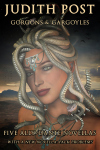 http://www.amazon.com/Gorgons-Gargoyles-Ally-Dante-Novellas-ebook/dp/B00I3KG7CY/ref=sr_1_10?s=digital-text&ie=UTF8&qid=1391110606&sr=1-10&keywords=Judith+Post
http://www.amazon.com/Gorgons-Gargoyles-Ally-Dante-Novellas-ebook/dp/B00I3KG7CY/ref=sr_1_10?s=digital-text&ie=UTF8&qid=1391110606&sr=1-10&keywords=Judith+Post


January 27, 2014
Writing–how to get depth
Feedback on writing is a tricky thing. Flat statements are just frustrating. “I loved that,” makes me happy, but doesn’t help me much. “I hate that,” hurts, but it doesn’t tell me what didn’t work or what to look at and maybe fix. I say maybe, because no writer is ever going to please everyone. And that’s probably a good thing.
I followed a LONG thread once on Goodreads about reviews–what readers, bloggers, and writers considered a good review. I liked the comments because they came at reviews from a lot of different angles. Readers looked for information that would help them decide if they wanted to read a book or not, if it was worth picking up; and I have to say, the readers proved generous and discriminating to authors. They wanted to like their books. If there were characters they could like or a plot that could entertain them, they were pretty forgiving of flaws if they saw some potential or promise for improvement. I found that encouraging.
Bloggers read a book and tried their best to give enough details to inform readers what was good about it and what wasn’t. I learned a lot from their comments because they took the time to list what they considered each book’s strengths and weaknesses. And writers tended to comment on how they approached good or bad feedback.
I’m thinking about all of this because I just got a new review on Amazon for Fallen Angels. I’m new enough that I don’t have that many, so a reader’s take on my work gets me pretty excited. This review particularly struck me because the comments were so thoughtful. The reader gave me three stars and said that she liked my book, but wasn’t crazy about it, that if it had more depth, it could have been a knockout. I really appreciated the time and thought the reviewer put into my novel–maybe because I’ve been trying to put more depth into my writing, and hopefully, each book has a little more than the one before it. But that brings me to the next question. What really adds depth?
My opinion is that depth comes from conflict and emotions. If we watch a character struggle with internal and external conflict and try to achieve a goal that’s important to him against great odds, if an author can bring that struggle to life, the character should have depth. The more he struggles, the more we care. Revealing the character’s frustration and determination and his inner battles makes him more real. Internal dialogue can reveal his reactions in scenes, but his actions speak just as loudly–probably more so. ”Actions speak louder than words” is just as true in fiction as real life. If a character tells himself that he’d give his life for his friend and then walks away when his friend is jumped, leaving him to battle by himself, the reader knows how that character really feels. If he feels guilty for his actions later, the writer’s given him a new layer of depth. On the other hand, if he has to walk away, when he doesn’t want to, sacrificing his friend to save others, the author’s created even more depth, because the more internal conflict for the character, the more powerful the story.
I’m starting work on my third Enoch/Voronika novel later this week. That should keep me busy for a few months to come. Let’s hope I can add more depth to this one. I’m trying!


January 21, 2014
Writing–& reading
Schools have been canceled so many days here, my grandson Nate (who hates school) is beginning to miss it. Thankfully, he’s a senior in high school and graduates this year. He has no intentions of going to college. He has ADD/ADHD and sitting in a classroom is close to torture for him. But damn, that kid is smart.
Yesterday, he dropped in to visit with us, since he didn’t have anything better to do. (When a kid’s 17, you know where you rate–behind almost everything:) He’d rented a movie, though, and he wanted me to watch it with him. I’d never heard of it–Into the Wild. But once we started it, I knew why it appealed to him. Nate loves the use of language. He loves ideas. The movie is about a boy, close to genius level, who graduates from college and walks away from everything to “live” life. He burns his money and makes his way across country by finding odd jobs or living off the land. And his true passion is books. He reads in his spare time. The movie’s worth watching. It’s based on a true story. Its ending demands Kleenex.
When school was canceled again today, Nate came again. And this time, he told me that he’d like to start reading books with “substance.” He wanted to know what the classics were. I couldn’t remember. We had to look them up, the 100 books that were deemed important enough to withstand time. Some of them, I’d read. Some of them, I’d avoided. I have to admit, even though I admire Charles Dickens and his social conscience, he’s the only author I ever cheated on and read cliff notes so that I wouldn’t have to finish the book. I know he’s an important author, and I’m glad he made the lists, but he won’t make mine. The official list we found: http://en.wikipedia.org/wiki/100_Classic_Book_Collection
These lists made me think. If I had to choose 5 or 10 books that I considered “must” reading, which books would I list? What about you? What would you advise someone to read as a “classic?”
My list: (I’ll limit this to 5 basics and hopefully, you’ll tell me what your top 5 would be–in random order):
The Devil and the Good Lord by Jean-Paul Sartre (a play)
The Odyssey by Homer
Dead-Eye Dick by Kurt Vonnegut
Macbeth by Shakespeare
To Kill A Mockingbird by Harper Lee
(for girls): Pride and Prejudice by Jane Austen
(for girls): the Bronte sisters–Wuthering Heights and Jane Eyre
(for younger readers): Harry Potter
(for mystery lovers): Agatha Christie–okay, I’m pushing it now. Sherlock fans will throw things at me, but I like Agatha more.
(for pure joy of ideas and language): e pluribus unicorn by Theodore Sturgeon
I admit, this was tough. I’ll probably change my mind about what should be on my list once I think about it more, but what would you recommend?


January 19, 2014
Writing–I finished my Ally/Dante novella series
This year, I want to spend more time writing novels, so I’ve been trying to finish and bundle most of my novella series. I sent the last Ally/Dante story to Dystel & Goderich to put up soon, and Michael Prete made two, new covers for me (which I love. If you’d like to use him, you can reach him at http://vertex10.com/). I’m really happy with the way the series has turned out. But this is the series where I let myself indulge my love of Greek myths, and now, it’s over.
When I was little, I had a fondness for Aesop’s fables and Grimm’s fairytales (the modern, nice versions–before I discovered The Year’s Best Fantasy and Horror anthologies, with not so nice versions). I had a brief fling with James Fenimore Cooper, Jane Austen, and James Hilton, flirted with Shakespeare and English Lit in college, and then got hooked on mysteries. But when I took Latin in high school and discovered the myriad of Greek myths, I became an addict. My youngest sister is twelve years younger than I am, and I used to tell her Greek myths as her bedtime stories. She still remembers them. (She might be as bad as I am).
For the Ally/Dante stories, I wanted to focus on what happened to the two sisters that survived Medusa’s curse. I wondered about them when I read Medusa’s full story. The girls’ parents were both deities, and they disowned all three girls when Athena turned them from beautiful to gorgons. Now, that’s a great inciting incident for a story in itself. I figured that would have to leave a bit of bitterness for Euryalis (one of the sisters). I mean, all three girls in some myths (and myths change with time, so choose which version you want to use for your story) were stunningly beautiful. Suitors pursued them, and they could pick and choose. Medusa was a priestess in Athena’s temple, and when she fell for Poseidon, they chose the temple to rendevous. A bad decision. Athena discovered them and cursed Medusa, since she couldn’t really punish Poseidon. BUT, she not only cursed Medusa, she also cursed her two, beautiful sisters.
Now, what’s not to love in this story? It has everything a writer could ever want for internal turmoil and conflict. A sister–Ally, who loves and champions her younger sister, even though what she did is wrong–and then she’s cursed by the gods for her sister’s sins, even though she’s done nothing wrong. More, Medusa is the only mortal of the three girls. Both Euryalis and Stheno are immortals, so they can’t die. But they CAN be killed, and their heads–if they’re removed–can be used as weapons to turn enemies to stone.
Oh, the joy! I wanted to take Euryalis and throw her in today’s world and see how she’d fare. A powerful demi-god hunts her, because he wants her head. Athena has softened her punishment, as much as possible, because Athena’s a pretty decent goddess once she calms down. But Ally–as she calls herself–still becomes a gorgon when push comes to shove. She might be a beautiful girl most of the time, but she’s the last, surviving sister and she’d like to stay that way–alive. She has enough emotional baggage to crush most people, but she tends to plug into the things that make her happy. And then, she meets a gargoyle. Gargoyles are protectors, and things go from there.
I have to admit, I enjoyed writing this series. It’s not for everyone. My daughter, Holly, isn’t a big myth fan. She liked the novellas, but they weren’t her favorites. My daughter, Robyn, loves myths, and she really enjoyed these. For me, they were a good time. I got to throw griffins, nymphs, and lotus eaters into urban fantasy plots. And it was fun.
My bundle will be up soon: 5 individual novellas gathered  as Gorgons & Gargoyles.
as Gorgons & Gargoyles.
http://www.judithpostswritingmusings.com/


January 13, 2014
Writing: Hits and Misses
I’ve been analyzing my hits and misses in writing. I’ve finally been at it long enough and tried enough things to look back and see how the dust settled. I had no idea what I was doing when I started out, and I’ve taken plenty of wrong turns.
Wrong turn #1: Novels take a chunk of time to write, so when I read an article that encouraged writers to post novellas between novels, to keep their name out there, that made sense to me. I didn’t think it through to the next, logical step, though. Most authors write those novellas about characters and events that tie into the series they’re known for. They use those novellas to keep readers interested in the fictional world they’ve created and eager for a new book’s release. That’s not what I did. I wrote in the same genre, but I wrote whatever struck my fancy. Not a great marketing ploy. Readers prefer series. They like reading book after book about characters they’re fond of.
Wrong Turn #2: I wish I’d have researched how to market my books a lot more and a lot sooner. I’m lucky enough to have Dystel and Goderich Literary Management behind me, and my wonderful, patient agent–Lauren Abramo–wouldn’t let me put my books online until I started a blog, had 50 followers on Twitter, and had a web page. She encouraged me to try an author’s page on Facebook, too–which I’m still not very good at. But those things are just dipping your toes in the water of book promotions. I joined Goodreads and learned a lot from “listening” to the authors and bloggers on there. I bought John Locke’s and Kristen Lamb’s books on marketing. I didn’t really “get” the basics, though, until I discovered Lindsay Buroker’s blog. And then I finally realized that if an author doesn’t promote herself, readers don’t find her. The sad truth is, I don’t have a ready-made audience, dying for my next book or novella to come out. I have to jump up and down and say, “Hey, I’m here. You might want to try my new Emerald Hills story.” Or whatever I’ve put online that’s new. I now set time aside to look at different sites on the web that promote authors’ books. Before I offer a book or novella for free or at a reduced price, I have some kind of free or paid promotion set up. Some of the sites only charge ten or twenty dollars. Others charge more. I’m experimenting with different ones, but anymore, I don’t cast my poor, naked novel into the cold, vast universe of millions of books without a little advertising love.
A lucky hit: When I started writing, I had no idea what I thought might actually make a successful series, so I started three of them. Now, this might seem to go against the wisdom that readers love a series. After all, if I’d have written three books with the same characters, I might have built up more of a faithful following. That’s what most authors do, and it works. But part of being a writer is knowing what works for myself. And I need a certain amount of variety to keep me interested in my own stories. While I work on an Enoch and Voronika novel, Reece and Damian can simmer in the background. And when I work on Reece’s plotlines, Tyr and Diana stew in my mind. I’m not sure I needed three series to keep myself happy, but I know that when I finish a book, I’ve lived with those characters day in and day out until I’m ready for them to take a hike and leave me alone for a while. But by the time I finish two other books with completely different characters, I’ll actually miss old Enoch and be ready to cause him grief and trouble again. I think the breaks help keep my series fresh.
Lately, I’ve noticed that some of my favorite authors, who write some of my favorite mystery series, seem to be struggling. The authors who only write one series with one set of characters, in my opinion, get tired of them. Their books feel flat, forced. Sometimes, I even wonder if they still like their protagonists. I understand why so many authors write at least two, different series. It gives them time to shift gears, to catch their breath, and to want to spend time with their characters again. I stumbled on that by accident, but I’m glad I did.
http://www.judithpostswritingmusings.com/



